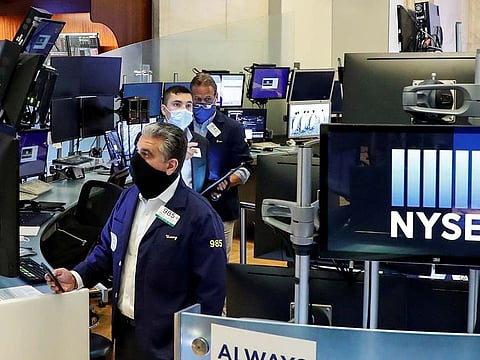Wall Street investors spooked as consumer worries rise
US value stocks may be getting a second wind as bets on economic strength bolster

Also In This Package
New York: Stocks on Wall Street shuffled to a meek end to the week, after choppy trading marked by a shock collapse in consumer confidence amid the acceleration of new coronavirus infections.
The Dow and S&P 500 ended essentially flat on Friday, but eked out a fourth consecutive record close and modest gains for the week amid thin summer trading.
Shares drifted higher at the open, but retreated after the University of Michigan reported its consumer sentiment index plunged to its lowest level in a decade as the Delta variant of Covid-19 continues to spread.
“There is little doubt that the pandemic’s resurgence due to the Delta variant has been met with a mixture of reason and emotion” from consumers, the survey’s chief economist, Richard Curtin said.
The index fell 13.5 per cent - one of the largest declines ever recorded - to 70.2 on concerns the economy will suffer and amid “dashed hopes that the pandemic would soon end,” he added.
At the end of the final trading session of the week, the Dow Jones Industrial Average was up just over 15 points to 35,515.38, while the broad-based S&P 500 added 0.2 percent to 4,468.01 - both setting new all-time highs.
The tech-rich Nasdaq Composite Index edged up less than seven points to finish at 14,822.9.
Disney rose 1 per cent following better-than-expected earnings marked by a sharp jump in streaming subscriptions.
Boeing lost 1.6 per cent after reporting trouble with its Starliner spacecraft that will delay an unmanned test flight to the International Space Station for several months.
Can value stocks get a second chance?
US value stocks may be getting a second wind, as bets on economic strength bolster Treasury yields and lift cyclically-sensitive shares that have stagnated in recent months after a powerful rally earlier this year. The S&P 500 value stock index, which is relatively heavily weighted in shares of financials, energy firms and other economically sensitive companies, is up 5.5% from last month’s lows, outperforming its tech-heavy counterpart by more than a percentage point in a rally that accelerated over the past week. The value index is up 18% this year, despite stalling after a strong start to 2021. The move may herald a nascent comeback for the so-called reflation trade, a bet on rebounding economic growth that saw value stocks surge starting late last year alongside Treasury yields. Some investors believe growth will remain strong in the U.S. even after peaking in the second quarter. US gross domestic product is expected to rise 6.1% in 2021, and 4.8% in 2022, according to Oxford Economics, stronger than what annual growth has been for the past decade. “We havent seen growth rates this high in some time and thats why we think ... value can keep outperforming, even once the rate of growth peaks,” said Sameer Samana, senior global market strategist at Wells Fargo Investment Institute. Among those calling for more gains in value stocks are technical strategists at JPMorgan, who in the past week said the S&P 500 value index “looks poised for a breakout.” Truist Advisory Services on Wednesday said it expects more upside for value over the next 12 months given the still strong economic outlook and weak earnings trends for tech compared to the broader market. Next week, the monthly US retail sales report and earnings from retailers such as Walmart and Target could shed more light on the health of the consumer. Investors are also keeping a close eye on Treasury yields, with rising yields often viewed as a sign of economic optimism that could also boost value stocks. Higher yields also particularly benefit profit margins of banks, which tend to make up large portions of value indexes. Plenty of stumbling blocks remain for the value trade. Signs that the coronavirus is threatening the economic outlook could send investors back toward large technology and growth shares that performed well for much of 2020. Data on Friday showing that consumer confidence fell to its lowest level in a decade weighed on yields. -- Reuters
-- Reuters
Sign up for the Daily Briefing
Get the latest news and updates straight to your inbox








